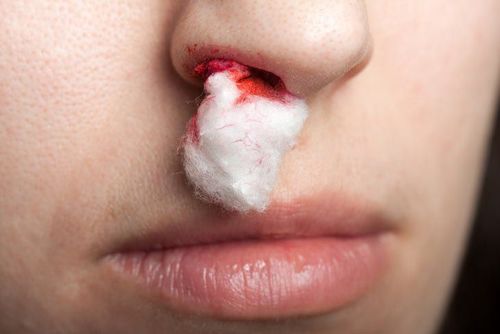This is an automatically translated article.
Nosebleeds can be caused by infection, trauma, allergic reaction, nose picking, or being pushed into the nostril by a foreign object. Nosebleeds are common in children and usually aren't serious. So, what is the deficiency of a baby with nosebleeds?
1. Characteristics of nosebleeds
1.1. What is a nosebleed? Nosebleeds or nosebleeds are blood loss from tissues in the nose. It can easily occur due to the position of the nose and the proximity to the surface of the blood vessels in the lining of the nose. Usually, nosebleeds are not serious.
1.2. How does nosebleed affect you? The nose has many blood vessels that help warm and humidify the air you breathe. These vessels are close to the surface and are prone to injury - which can cause nosebleeds. However, sometimes nosebleeds are more serious. They come from the large vessels at the back of the nose. Nosebleeds due to these large vessels often occur after trauma, in young children or the elderly. Usually, the older the patient, the more severe the nosebleed.

Chảy máu cam thiếu chất gì là thắc mắc của một số người bệnh hiện nay
2. Nosebleed is due to lack of substance?
Nosebleeds occur when small blood vessels in the nose burst and bleed. Most cases of nosebleeds do not have a clear cause. If you have a lot of nosebleeds, it could be due to a number of reasons:
Dry climates or hot, dry air that dry out your nose causes your blood vessels to gradually become sensitive and possibly burst; Or pick your nose, rub your nose or rub it too hard; Chemical irritants such as ammonia; cocaine; aspirin medicine ; Cold ; Blowing your nose repeatedly and too forcefully; Allergies, infections of the nose, throat and sinuses; Due to trauma to the nose; Due to allergies or allergy medications can dry the nose; Straining when defecating, constipated; A deviated septum in the nose; Using certain medications, such as anti-inflammatory medications, sprays; Injury to the head and face; taking certain blood-thinning medications; Bleeding or clotting disorder. Some other less common problems of nosebleeds such as: Alcohol use; Immune thrombocytopenia (ITP); Hereditary hemorrhagic telangiectasia; Leukemia; Nose and Nose Tumors;...If your nosebleeds don't stop or you're bleeding heavily from your gums, you should see your doctor to get your condition checked.
So the baby or nosebleed is due to a lack of what substance? That is when the child's body lacks vitamin C, vitamin K or minerals involved in blood synthesis such as iron and potassium, which is also the cause of nosebleeds or an unscientific diet and the baby has a habit of picking his nose. Too much force will cause the baby to have a nosebleed. In addition, strong impact or dry, cold weather makes the nose dry, prone to peeling and bleeding. Therefore, for a diet, scientific activities have a great impact in the prevention and treatment of nosebleeds for children.
3. Can nosebleeds be prevented or avoided?
3.1. Prevent nosebleeds Keep your child's fingernails short to limit trauma to the nose and prevent nose picking. Combat the drying effects of hot indoor air by using a night-time humidifier in your bedroom. Open your mouth when you sneeze. 3.2. Nosebleed Treatment When your child has a nosebleed, try to stay calm. Almost all cases of nosebleeds can be treated at home.
If you have a nosebleed, sit down and lean forward slightly. Keeping your head above your heart will slow down the bleeding. Lean forward so the blood flows out of your nose instead of down the back of your throat. If you lean back, you could swallow blood. This can lead to irritation of your stomach. Use your thumb and index finger to squeeze the soft part of the nose together. This area is located between the end of your nose and the hard spine that forms the bridge of your nose. Hold your nose until the bleeding stops. Don't let it take at least 5 minutes. If the bleeding is still bleeding, keep the wound in place for 5 to 10 minutes. After the bleeding stops, wait a few hours before doing anything that could bring the bleeding back, such as bending over or blowing your nose.
3.3. Living with Nosebleeds Nosebleeds can be frustrating. They come on suddenly, often without warning. They are usually not harmful.

"Chảy máu cam thiếu chất gì?" đa số chảy máu cam thường không gây hại
4. Diet to prevent nosebleeds
4.1 Vitamin C supplementation Vitamin C deficiency not only makes the immune system of children less healthy but also a common cause of nosebleeds. Therefore, the food group rich in Vitamin C will be at the top of the list of foods that children with nosebleeds should eat a lot.
Supplementing with adequate vitamins for a long time will help strengthen blood vessels, limit damage that causes nosebleeds or other bleeding conditions. Additional sources from natural foods also meet this need, especially fruits rich in Vitamin C including: tangerines, oranges, bell peppers, guava, blueberries, strawberries, grapefruit,...
4.2 . Vitamin K supplementation If Vitamin C plays a role in strengthening blood vessels, Vitamin K is a structural component that stabilizes blood clotting. Children with blood clotting disorders will often have nosebleeds and have a high risk of hepatobiliary diseases, heartburn, celiac disease,...
Foods that are rich in Vitamin K should be added including: curly, asparagus, cauliflower, basil, spinach, cabbage,...
4.3 Iron supplementation Children with iron deficiency not only will easily have nosebleeds, but also become anemic, and face many problems other health issues. Therefore, in the child's diet, it is impossible to lack this mineral supplement such as:
Red meats: goat meat, beef, .. Seafood: shrimp, cockles, crab, etc. .. Nuts and whole grains or molasses 4.4. Potassium supplementation For the human body, the need for Potassium is not too high, but a deficiency can still occur due to your improper nutrition. This trace substance will participate in the process of regulating blood circulation. Therefore, when this condition is encountered in young children, the risk of dehydration and loss of moisture in the capillaries will lead to rupture of small blood vessels in the nose.
Here are the foods rich in potassium that parents should give their children when they have a potassium deficiency, including: fish, clams, green vegetables, yogurt, bananas, avocados, tomatoes, carrots,...
4.5. Stay hydrated. Lack of fluids or moisture can cause dryness in the nose and cause nosebleeds. Therefore, make sure to drink enough water every day. The types of water can come from filtered water or fruit juices, broths, soups,...
Above is information about nosebleeds that you need to know to know how to treat and should supplement. appropriate diet to limit bleeding in the next time.
Follow Vinmec International General Hospital website to get more health, nutrition and beauty information to protect the health of yourself and your loved ones in your family.
Please dial HOTLINE for more information or register for an appointment HERE. Download MyVinmec app to make appointments faster and to manage your bookings easily.













